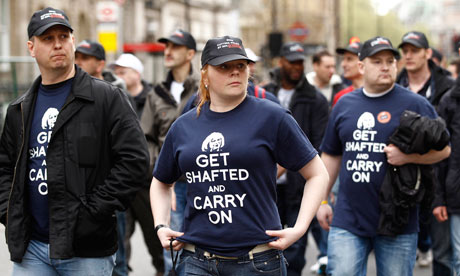
The perennial request for more police on the streets was met in satirical fashion on Thursday', when more than 30,000 officers marched against the cuts in London. Photograph: Eddie Keogh/Reuters
I realise that history repeats itself as farce, and increasingly does so within approximately three news cycles, but could the phrase "shareholder spring" please be beaten, tortured, and buried in an unmarked grave at the earliest possible convenience?
Illustration by Jas
How can the mere risk of life and limb against brutal regimes be metaphorically yoked to the sheer inspirational courage it takes to turn up to an AGM at the Canary Wharf Hilton because you're ticked off about the dip in your dividends … but no, I don't think any of us has the stomach to continue with that particular line in sarcasm. Even by the glib standards of Her Majesty's Press, the classification "shareholder spring" seems quite the achievement. If "spring" is the cliche du jour, then I actually yearn for the return of the Watergate-inspired "-gate" suffix. Come back, -gate. All is forgiven.
Perhaps there really is the odd, blinkered, S-Class Mercedes-driving arse, in a tizz about his dividend, who imagines that provoking the resignation of the Aviva boss over executive pay is in some way akin to running the gauntlet of Bashar al-Assad's death squads. I implore him to get in touch.
In the meantime, let's dispel the great myth about the so-called "shareholder spring", which is that the plucky rebels are making some sort of significant moral point. With the rare exception of shareholding pressure groups such as War on Want, those voting down remuneration packages have only affected a conscience after sustaining losses in the financial crisis. As their almost total placidity displayed in the years when the fat cows were coming out of the Nile, they couldn't give a toss about executive pay if their dividends are up.
Even now, their rooting out of injustice appears highly targeted. Anyone detecting some sort of sudden altruistic commitment to the greater good among most shareholders is seeing things. Theirs is merely a different class of self-interest.
Still, you have to admire their insouciant refusal to consider their part in the problem. We know all about emetic levels of executive pay; that has long been part of the conversation about how we found ourselves up the creek. But less frequently discussed is the ever-increasing pressure that firms – particularly those in the financial sector – were under to pay hugely cavalier dividends to their shareholders. In many cases they have continued to do so after the financial crisis hit, instead of putting aside money as capital to cushion themselves in the event of further recessions or crises. So perhaps I've missed it, but I can't recall any AGM proposals in which shareholders criticise management for rewarding them too generously in the past. It might be the most surreally retroactive of resolutions, but it would make a valuable point.
After all, the AGM setting does not preclude the making of radical philosophical points, as HSBC – the financial sector's biggest dividend payer – discovered almost a decade ago. Present at its shareholders' meeting was one of the bank's night-time cleaners. Charities had bought shares for Abdul Durrant, and he made an extraordinary plea to the bank's boss to be paid a living wage.
"In our struggles our children go to school without adequate lunch," Durrant explained in front of all the other shareholders. "We are unable to provide necessary books for their education. School outings in particular they miss out on. In the end, many of our children prefer a life of crime to being a cleaner." Which rather puts today's shareholder moralising into perspective.
Still, if absurdist uprisings are your bag, you were certainly spoiled for choice this week. The perennial request for more police on the streets was met in satirical fashion on Thursday, as an estimated 30,000 officers in London alone tore themselves away from lucrative overtime or being on the sick to march against budget cuts and changes to their working practices. "Remember what you did to the miners!" was the tart verdict of one of the protesters in the separate public sector workers' strike. "Have a bath," was one officer's retort to the Socialist Workers party demonstrator who gave up a mischievous cry of "Charge the police!" (Incidentally, huge thanks to the several coppers and ex-coppers who contacted me after last week's column with observations that tended toward the aggressive. I would report the worst offenders of you to yourselves, but naturally fear the whole episode could end in a bizarre incident in which I was alleged to have kicked myself down the nick stairs.)
Perhaps we get the revolutions we deserve. If Britain's contribution to global democratic sea changes is to be a "shareholder spring" and a bunch of policefolk reclaiming the streets from themselves to defend their Spanish practices, then that is a matter for sobering reflection. In fact, in the interests of completing the trifecta, I would now like to see MPs march against a penny of cuts to their own diamond-encrusted pensions. It would be a development that would indicate the news had finally eaten itself, admittedly, but that might offer some perverse form of closure.

No comments:
Post a Comment